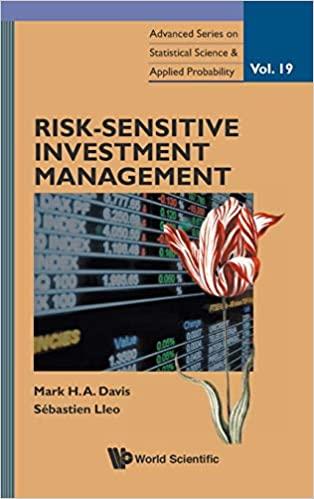
4. Consider the following 3 risk free bonds. Bond A and Bond B are zero coupon bonds which give a single payment of principal and accrued interests (if any) at maturity. Bond C is a 2-year bond that pays a 10% coupon annually. All 3 bonds have a PAR value of $100. Cashflow Current Bond Price at Market Year 1 Year 2 Bond A $89.50 $100 $0 Bond B $80.00 $0 $100 Bond C $95.00 $10 $10 $110 (A) Calculate the Yield to Maturity of these 3 bonds? (3 marks) (B) Of these 3 bonds, which one is relatively over-priced? (1 mark) (C) Of these 3 bonds, which one is relatively under-priced? (1 mark) (D) The 3 bonds in the table are inconsistent with "law of one priced. Describe a portfolio of bonds that would profit from this inconsistency by generating a positive cashflow today and zero cashflow in Year 1 and Year 2. Assuming you can buy and sell any of the 3 bonds at the prices shown. (3 marks) (E) A new bond, Bond D, pays $20 at the end of Year 1 and $120 at Year 2. Assuming that Bond A and Bond B are priced correctly, what Bond D price would be to satisfy law of one price"? (2 marks) Note: The law of one price is the economic theory that states the price of an identical security, commodity or asset traded anywhere should have the same price regardless of location when currency exchange rates are taken into consideration, if it is traded in a free market with no restrictions. The law of one price exists because differences between asset prices in different locations should eventually be eliminated due to the arbitrage opportunity. 4. Consider the following 3 risk free bonds. Bond A and Bond B are zero coupon bonds which give a single payment of principal and accrued interests (if any) at maturity. Bond C is a 2-year bond that pays a 10% coupon annually. All 3 bonds have a PAR value of $100. Cashflow Current Bond Price at Market Year 1 Year 2 Bond A $89.50 $100 $0 Bond B $80.00 $0 $100 Bond C $95.00 $10 $10 $110 (A) Calculate the Yield to Maturity of these 3 bonds? (3 marks) (B) Of these 3 bonds, which one is relatively over-priced? (1 mark) (C) Of these 3 bonds, which one is relatively under-priced? (1 mark) (D) The 3 bonds in the table are inconsistent with "law of one priced. Describe a portfolio of bonds that would profit from this inconsistency by generating a positive cashflow today and zero cashflow in Year 1 and Year 2. Assuming you can buy and sell any of the 3 bonds at the prices shown. (3 marks) (E) A new bond, Bond D, pays $20 at the end of Year 1 and $120 at Year 2. Assuming that Bond A and Bond B are priced correctly, what Bond D price would be to satisfy law of one price"? (2 marks) Note: The law of one price is the economic theory that states the price of an identical security, commodity or asset traded anywhere should have the same price regardless of location when currency exchange rates are taken into consideration, if it is traded in a free market with no restrictions. The law of one price exists because differences between asset prices in different locations should eventually be eliminated due to the arbitrage opportunity







